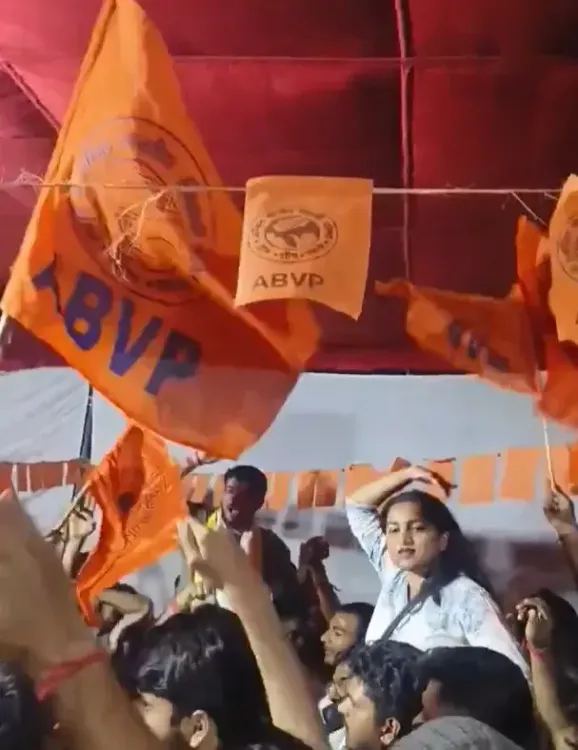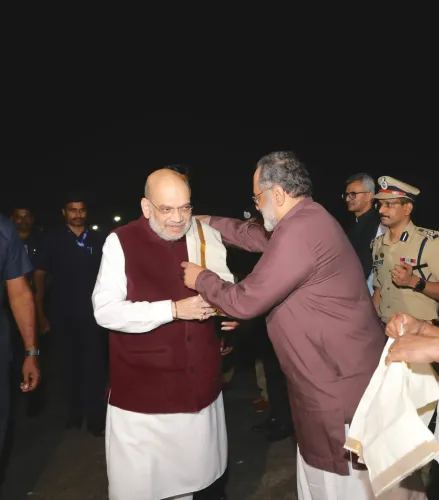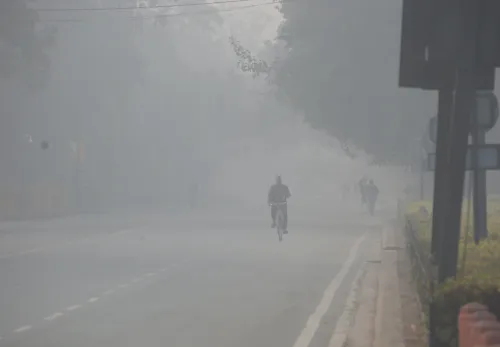Did ABVP Break a Decade-Long Drought with Historic Gains in JNUSU Elections?

Synopsis
Key Takeaways
- ABVP ends a decade-long dry spell in JNUSU elections.
- Vaibhav Meena elected as Joint Secretary with 1,518 votes.
- ABVP won 23 out of 42 councillor seats.
- Voter turnout reached 68.3 percent with 5,400 participants.
- Intense competition among various student organizations.
New Delhi, April 28 (NationPress) The Akhil Bharatiya Vidyarthi Parishad (ABVP) has achieved a remarkable milestone in the history of the Jawaharlal Nehru University Students’ Union (JNUSU) elections. Vaibhav Meena, representing the ABVP, has successfully secured the role of Joint Secretary, ending a ten-year stretch of setbacks for the organization.
This victory symbolizes ABVP’s outstanding performance, as it has won an impressive 23 out of 42 councillor seats across 16 schools and special centers—marking the highest number of seats captured by any student organization.
Amit Malviya, the BJP's National Information and Technology Department In-charge and Co-in-charge for West Bengal, shared this significant achievement on his X handle: “Jawaharlal Nehru University Students’ Union (JNUSU) has triumphed: Akhil Bharatiya Vidyarthi Parishad (ABVP) candidate Vaibhav Meena has been elected as Joint Secretary. Furthermore, ABVP has delivered an unparalleled performance in the JNUSU elections, clinching 23 out of 42 councillor seats across 16 schools and special centers - the most seats ever won by any student organization.”
During the vote-counting, ABVP candidates exhibited exceptional strength, leading in all four central panel positions and presenting a strong challenge to the university's longstanding Left-leaning political influence.
While the ABVP did not capture the President, Vice-President, or General Secretary positions, the narrow margins underline a noticeable shift in campus dynamics.
Vaibhav Meena’s victory as Joint Secretary was achieved with an impressive count of 1,518 votes.
Nitish Kumar from the All India Students’ Association (AISA) was elected President with 1,702 votes, while Manisha and Munteha Fatima, both from the Democratic Students’ Federation (DSF), took the Vice-President and General Secretary roles, respectively.
Manisha received 1,150 votes, while Munteha Fatima’s victory further strengthened DSF's position in the central panel with 1,520 votes.
The ABVP presented a comprehensive panel, with Shikha Swaraj, Nittu Goutham, Kunal Rai, and Vaibhav Meena vying for the positions of President, Vice-President, General Secretary, and Joint Secretary.
Their campaign demonstrated a strategic and focused effort to redefine the political landscape on campus.
The elections, conducted on April 25 after delays due to campus unrest, experienced an enthusiastic voter turnout of nearly 70 percent, with approximately 5,500 students participating.
This multi-faceted contest featured intense competition among strategic alliances: the All India Students Association (AISA) partnered with the Democratic Students’ Federation (DSF), while the Students’ Federation of India (SFI) collaborated with the Birsa Ambedkar Phule Students’ Association (BAPSA), the All India Students’ Federation (AISF), and the Progressive Students’ Association.
The ABVP ran independently in this election.
Despite this year’s turnout of 68.3 percent, slightly below the record-breaking 73 percent participation in the 2024 elections, it still indicates strong engagement. Out of 7,906 registered voters, 5,400 cast their votes on the election day. Polling took place in two sessions, from 9 a.m. to 1 p.m. and 2:30 p.m. to 5:30 p.m., across 17 booths on the JNU campus on April 25. The counting of votes began late Friday night, with results officially announced on Monday (April 28).










